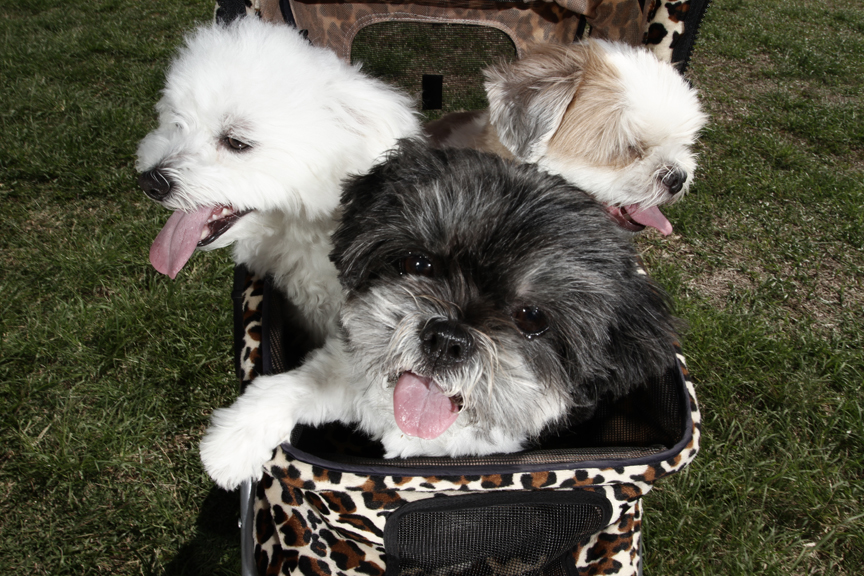

Have we all lost our minds and gone to the dogs? We examine the shifting perceptions parents have toward their furry children.
My little dog Piko really can’t help but to be naughty. I think it’s in his DNA. Some days I catch him in the act. He stares at me wide-eyed, like a deer. He’s standing in the middle of the kitchen table, a mess of empty wrappers and half-eaten chicken chewys around his paws. “NO! Naugh-ty!” He does a little hippity-hop, like a bunny rabbit, and scampers off. He’s fond of peeing on people, cabinet corners and kitchen garbage cans. (He even peed on our photographer’s flash during our photo shoot.) He’s capable of opening refrigerator doors and pushing chairs with his paws to reach out-of-reach places (like the kitchen table).
Despite all of his naughtiness, Piko, as the name on his medicine bottle implies (“Piko Yamada”), is part of the family. He has a mom, a grandpa and grandma, and two Lhasa Apso cousins, whose dad is my brother. As much as I hate to say it, we’ve become those people. Those people that dress their dogs, tote them around in Juicy and push them through malls in strollers. We, like an increasing amount of people, contribute to the ballooning $45 billion industry with every designer shampoo and organic doggie biscuit that we buy. Despite lagging sales for virtually every other retail sector, the pet industry saw a 5.4 percent increase last year.
In recent years, there has been a shifting in the attitudes people have toward their pets, and of their dogs in particular. Our furry four-legged friends have become, as Michael Schaffer in his book One Nation Under Dog calls them, “junior humans” or “fur babies.” They’ve taken the place of children for empty nesters, prepped newlyweds for the pains and joys of raising real human babies someday, and in some cases they’ve become the children for those who have no other option.
“Children will go on and lead their own lives, but pets don’t have any world beyond the one that you create for them,” says veterinarian Joy Lynn Yasuda-Tanigawa, hypothesizing the reason for the close relationship people have with their pets. “You will always be their world.” Yasuda-Tanigawa works at the VCA Family Animal Hospital in Pearl City, only one of two 24-hour emergency hospitals on the island. As a vet, she’s seen, in plain dollars and cents, the shift in people’s perceptions of their pets. “When I was little, our dad would never pay for the kinds of things that people are doing now,” like the CT scan she’s to follow up with after our interview. The procedure, which is done afterhours at Queen’s Medical Center – yes, the hospital for humans – can easily run upwards of $1,000.
When Mushu, our 15-year-old Japanese Spitz, got sick last year, we took him in to VCA, and immediately dropped $800 for an exam and X-ray. His stomach lining was connected to his heart sac and would require extensive surgery, costing about $5,000. Although he had already lived a good long life, and he probably wouldn’t see too many more, we seriously considered the surgery. Some family members opposed, but others reasoned, well he’s a part of the family and you don’t just put family members to sleep. Graciously, Mushu crossed the Rainbow Bridge later that night, going into cardiac arrest and eventually heart failure, thus sparing us the decision of whether to do the surgery or not. Total cost of Mushu’s bill: $1,400.
Yasuda-Tanigawa says it’s not uncommon for pet owners to drop big money on their pets. The most she’s seen an owner spend? Seventeen thousand dollars. “And the dog ended up dying. It had pancreatitis and it was in the hospital for weeks,” she says. The second most she’s seen an owner spend was $15,000. Explains why the veterinarian profession has seen an explosion in specialties, from dermatology to oncology to radiology to ophthalmology to cardiology – wait, we are still talking about animals, right?
Pets will always be doted on so long as there are humans around. In fact a recent study by American Pet Products Association found that American pet owners would readily perform an act of self-sacrifice, reallocating their dollars to maintain the quality of life for their pet. And really no dog knows this better than Piko. Whenever Piko’s grandpa comes home, he’s just as excited to see Piko as Piko is to see his grandpa. “Heeeey palsie! Did you see your friends today?” he asks, referring to Piko’s daily walks. “Did they say ‘roof’ or ‘ruff’? They all have ‘ruff’ life, but not like you, yeah, Piko?” He immediately opens the fridge and throws Piko a bite-sized piece of New York steak. Us humans have gone to the dogs. But really, there’s no harm in that.
To see the full article, purchase our Fall 2010 PERCEPTION issue HERE.

